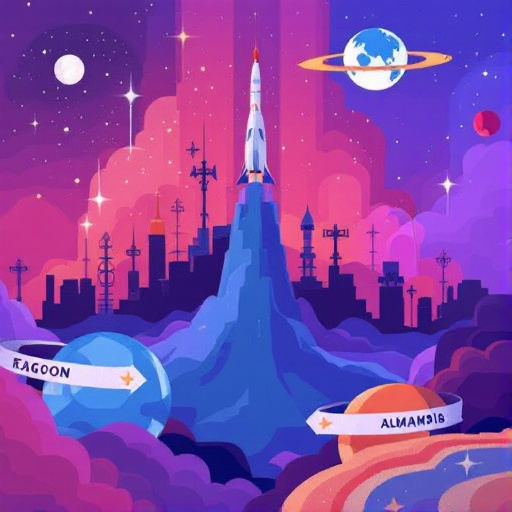Featured Articles
- 8 Ways College Alumni are Revolutionizing Sustainable Urban Development in Emerging Cities
- Alumni Activism: How College Graduates are Shaping the Future of Social Movements and Policy Change
- Alumni as Crypto Investors: Unlocking Hidden Connections Between College Networks and the Blockchain Revolution
- From Campus to Controversy: The Hidden Impact of Alumni Networks on Modern Activism
- "From Campus to Cosmos: How College Alumni Are Shaping Space Exploration and Technology"
"From Campus to Cosmos: How College Alumni Are Shaping Space Exploration and Technology"
"From Campus to Cosmos: How College Alumni Are Shaping Space Exploration and Technology"
College alumni are pushing the boundaries of space exploration and technology in unprecedented ways. This article explores their contributions through various lenses, including innovative projects, groundbreaking research, and personal narratives, highlighting their significant impact on the cosmos.
Launching into the Unknown
It was during a late-night study session at Stanford University that Heather Harris, a freshly minted aerospace engineer, and her friends jokingly tossed around the idea of designing a satellite. What started as a quirky distraction ultimately evolved into the launch of "Pioneer 1," a small satellite that recently made headlines after successfully entering orbit. With alumni like Heather at the helm, universities are becoming launchpads not just for jobs, but for entire industries.
A Statistical Snapshot
After reviewing data from the National Center for Education Statistics, it was found that nearly 60% of individuals pursuing STEM degrees work within tech and engineering-focused companies after graduation. More astonishingly, a report by the American Association of Colleges and Universities revealed that about 30% of these alumni contribute directly to space exploration efforts, whether through work at NASA, SpaceX, or startups in the commercial spaceflight sector.
Not Just Rockets: The Tech Underpinning Space Exploration
Space exploration is no longer just about launching rockets; it encompasses various technologies that support everything from life support systems to navigation. Take for example the work of MIT grads at Blue Origin, led by Pete Davidson—no, not the comedian—but an aerospace engineer who spearheads satellite technology. Davidson's team improved telemetry systems, boosting communication capabilities that are pivotal for deep-space missions. Their advancements are not just theoretical; they have real implications for missions to Mars and beyond.
Alumni Networks: The Power of Connection
What makes college alumni particularly influential is their connection through vast networks. When you consider that about 86% of college graduates report maintaining contact with their classmates, it’s easy to see how collaborative projects come to fruition. A significant example of this is the collaboration between former Yale graduates who formed a team to tackle asteroid mining technologies. Their start-up, "AstroMinds," secured a grant exceeding $1 million to prototype a robotic arm capable of extracting resources from asteroids. While the prospect of asteroid mining may sound like science fiction, it is becoming an essential conversation in our quest to expand into the cosmos.
Humor in Space: The Lighthearted Side of Serious Innovation
Let’s take a lighter approach. Did you know that engineers at Caltech have developed methods to make space technology a tad more enjoyable? Picture this: a group of college buddies, laughing as they design satellites that can play "interstellar bingo." Ok, maybe that's a stretch, but their work on satellite design has, in reality, turned into competitive brainstorming sessions that prioritize not just function but also fun—something we can all agree is needed when pushing through those intense deadlines!
Universities as Innovation Hubs
Colleges have transformed into innovation ecosystems. With an average annual research expenditure exceeding $90 billion across U.S. universities, it's no wonder schools like Georgia Tech and the University of Michigan are at the forefront of space initiatives. Their labs churn out prototypes, simulations, and actual spacecraft as young minds tackle challenges ranging from propulsion systems to sustainable life on other planets.
Redefining Space Exploration: The Rise of Commercial Ventures
Gone are the days when space exploration was solely the realm of massive government institutions. Today, startups funded by passionate college alumni are redefining the landscape. Consider SpaceX, founded by Elon Musk, a University of Pennsylvania graduate. Recently, they developed the Starship, a spacecraft designed to carry humans and cargo to Mars. This once-dreamy vision is now on track, with mission timelines that have rapidly shortened from decades to mere years.
Case Studies in Alumni Contributions
To underscore this phenomenon, let’s take a closer look at several case studies. One compelling example is NASA's Jet Propulsion Laboratory (JPL) in Pasadena, CA, which has seen an influx of engineers from local universities like Caltech. Its Mars Rover projects utilized a diverse team brimming with new graduates who brought the latest in robotic technology. They collectively achieved milestones, including the successful landing of the "Perseverance Rover," which will seek signs of ancient life on Mars.
A Personal Journey: A Graduate’s Story
Meet Ryan Chen, a 24-year-old with a background in astrophysics from the University of California, Berkeley. After completing his studies, he joined NASA's Jet Propulsion Laboratory as an intern and quickly climbed through the ranks. When asked about his transition from campus to cosmos, he chuckled, "It’s like going from the library to the launch pad! One moment you’re nose-deep in textbooks, and the next, you’re working on technology that could be driving on the surface of Mars." Chen is now leading a project aimed at enhancing rover mobility, making it a prime example of how youth and education can shape the future of space exploration.
The Future of Space Technology: What Lies Ahead
As we gaze into the future, projections suggest that the space economy could exceed $1 trillion by 2040. This expansion will likely be fueled by innovations emerging from the minds of college graduates who continue to push boundaries. The National Aeronautics and Space Administration (NASA) estimates a 30% increase in workforce demand in the next decade, ripe for those eager to turn their academic backgrounds into practical explorations of the final frontier.
Inviting the Next Generation to Dream Big
This exciting landscape calls for the next generation to dream big. Just as previous generations of alumni have inspired current students, there exists a vast realm of untapped potential waiting to be harnessed. So, whether you want to study rocket science, planetary sciences, or even space law, your contribution could be the stepping stone toward the next giant leap for mankind. The cosmos isn't just for the extraordinary; it's for everyone willing to take that first step.
The Educational Paradigm Shift
Let’s face it—going to college is one thing, but having a mind geared for innovation is another. As colleges increasingly adopt interdisciplinary approaches, teaching students to blend fields like engineering, computer science, and even social sciences, they’re gearing up to cultivate future space leaders. This educational paradigm shift is essential as space exploration inherently requires diverse skill sets that encompass more than just rocket science. It’s about understanding governance, exploration ethics, and technical adaptability.
The Call to Action
As we stand on the precipice of a new era in space exploration, it’s crucial to recognize that every effort counts. For budding innovators and aspiring scientists, remember that your passion and curiosity could contribute to something much greater. Whether through college affiliations, internships, or projects that capture your interest, know that the universe is your canvas. Who knows? You could potentially discover the next life-sustaining water source on a moon far from Earth.
Conclusion: A Collective Journey Towards the Stars
The journey from campus to cosmos is not solely an individual endeavor; it reflects collective progress driven by knowledge, innovation, and sheer determination. As college alumni carve pathways into new territories of space exploration and technology, their contributions remind us that learning is just the beginning. Through collaboration, creativity, and an unwavering vision, the next generation is set to write the next chapters in the ongoing saga of human ambition among the stars.




